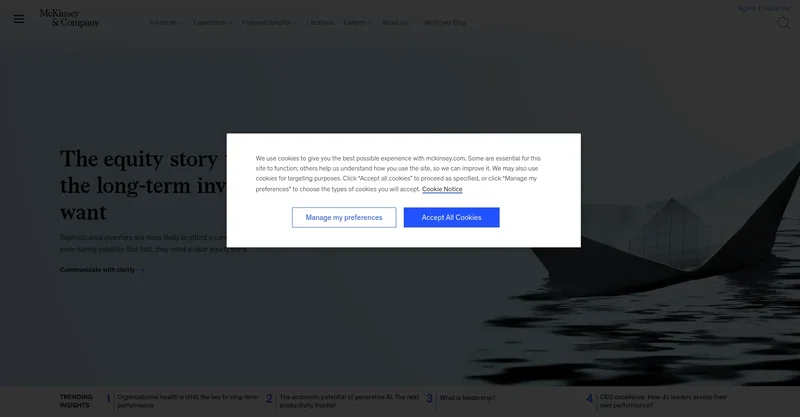McKinsey's AI Push: What It Means for Consulting and the Future of Work
Title: CFOs Prepare for the Unexpected: How AI and Economic Shifts are Reshaping 2026 Budgets
Okay, folks, let's dive into something fascinating that's happening right now, behind the scenes, in the world of finance. I'm talking about how CFOs are bracing for a future that feels less like a straight line and more like... well, like navigating a spaceship through an asteroid field.
Navigating the Uncertainty: It's Not Just About Numbers Anymore
The buzz is all about "downside protection." According to Kevin Carmody, a senior partner at McKinsey & Company, CFOs are taking a much more conservative approach to budgeting for 2026. And honestly, who can blame them? We're talking geopolitical instability, economic uncertainty still lingering after that government shutdown, and of course, the big one: AI. It's like trying to predict the weather on Mars – incredibly complex! As reported by CFO Dive, CFOs are reaching for downside budget protections, McKinsey exec says.
But here's the real kicker, the thing that got me out of my seat: it's not just about crunching numbers anymore. CFOs are having to become futurists, risk assessors, and tech strategists all rolled into one. They’re not just looking at spreadsheets; they’re trying to anticipate black swan events and figure out how to future-proof their companies now. What does that mean? It means prioritizing "must-spend" over "nice-to-have" with laser focus. It means stress-testing every assumption, every projection. And it means, crucially, understanding how AI will impact everything.
Think about it: budgeting for AI is like trying to catch lightning in a bottle. How do you budget for something that's evolving at warp speed, something that could completely disrupt your industry in a matter of months? It’s not just about the cost of implementation; it’s about the potential for entirely new business models that we can't even imagine yet. It’s about upskilling workers, attracting top talent, and making sure your company isn't left in the digital dust. When I read about this, I honestly felt a jolt of excitement – this is the kind of challenge that truly tests human ingenuity.
Carmody also emphasizes the importance of "realistic stretch targets." It's not enough to just aim for the moon; you have to understand the trajectory, the potential obstacles, and have a backup plan (or three) in place. He uses the example of rolling out a new product: instead of assuming a flawless ramp-up, CFOs need to "flatten that curve a little bit" to account for the inevitable bumps in the road. This is where judgment comes in, where experience and intuition become invaluable.

And here's something else that’s fascinating: even with all the technological advancements, companies are still sticking to the traditional annual budgeting process. Carmody sees value in this "static" approach, arguing that it helps everyone "row in the same direction." It's like planting a flag, declaring your intentions to the world. Now, I know there are those who argue that static budgets are outdated, that we should be moving towards continuous planning and real-time adjustments. But there's something to be said for having a solid foundation, a clear vision, even in the midst of chaos.
The Human Element: Judgment, Intuition, and a Little Bit of Courage
What does this mean for us, the average reader? It means that the decisions being made right now by CFOs will have a ripple effect on the entire economy. It means that companies are preparing for a future that's uncertain, yes, but also full of potential. And it means that the human element – judgment, intuition, and a little bit of courage – is more important than ever.
But here's the question that keeps nagging at me: How do you quantify the unquantifiable? How do you budget for innovation, for creativity, for the spark of genius that can transform an entire industry? How do you balance the need for caution with the imperative to take risks? These are not easy questions, and there are no easy answers.
I think back to the dawn of the internet, when businesses were scrambling to figure out how to navigate this new digital landscape. Some were cautious, some were reckless, and some found the perfect balance. The same is happening now with AI. Some companies will be paralyzed by fear, some will jump in headfirst without a plan, and some will find a way to harness its power for good.
Of course, with great power comes great responsibility. As we embrace AI, we must also be mindful of the ethical implications. We must ensure that it's used to create a more just and equitable world, not to exacerbate existing inequalities. We must be vigilant against bias, discrimination, and the potential for misuse.
So, What's the Real Story?
The real story here isn't just about numbers and spreadsheets; it's about human ingenuity, resilience, and the unwavering belief in a brighter future. It's about embracing change, even when it's scary, and using technology to create a world that's more prosperous, more sustainable, and more human. The future is not something that happens to us; it's something we create. And right now, CFOs are on the front lines, shaping that future, one budget at a time.
